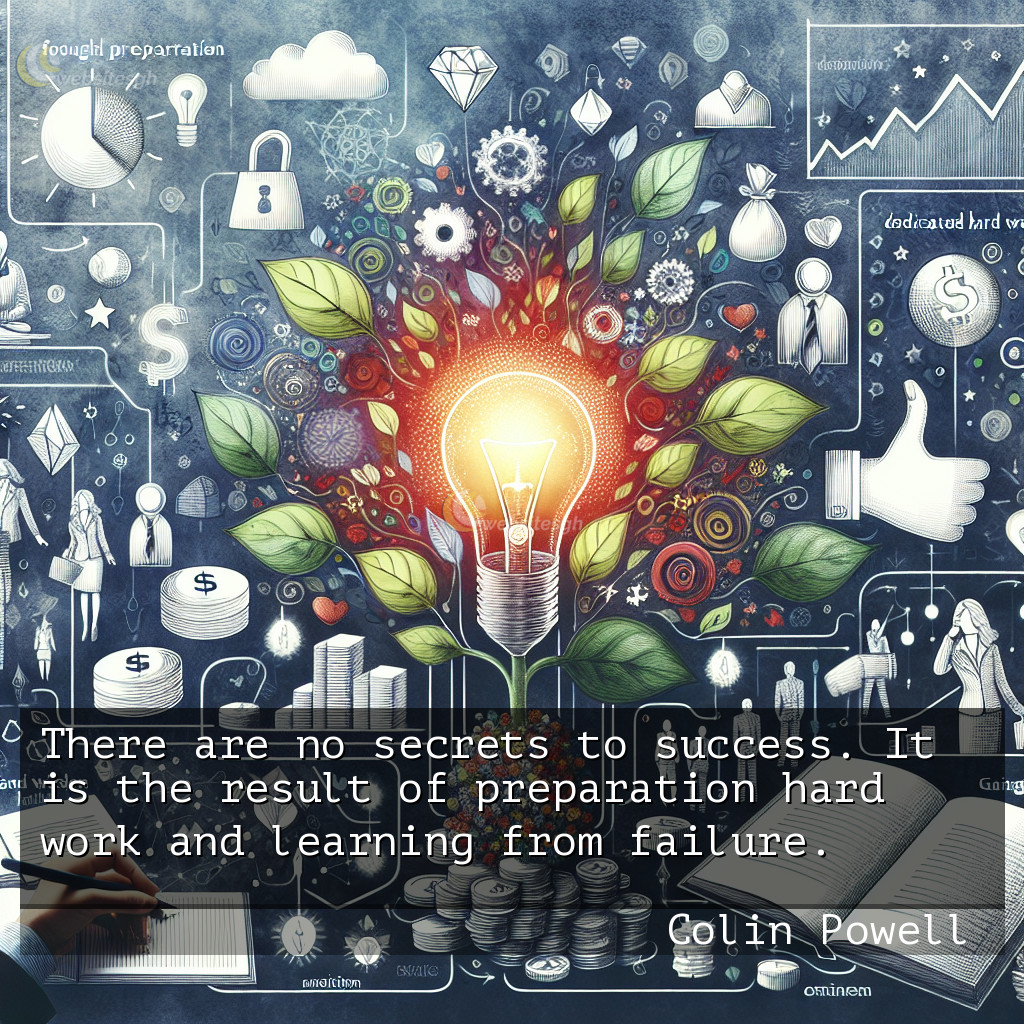This website uses cookies so that we can provide you with the best user experience possible. Cookie information is stored in your browser and performs functions such as recognising you when you return to our website and helping our team to understand which sections of the website you find most interesting and useful.

Colin Powell quotes on Business

Colin Powell quotes on Business
There are no secrets to success. It is the result of preparation hard work and learning from failure.
By: Colin Powell
Success often appears to be shrouded in mystery, an elusive prize that dangles just beyond the reach of many. However, the truth is far less enigmatic and much more actionable. As Colin Powell, the former U.S. Secretary of State, succinctly put it, “There are no secrets to success. It is the result of preparation, hard work, and learning from failure.” This simple yet profound statement encapsulates the essence of what it takes to achieve one’s goals and dreams. Let’s unpack this wisdom and see how it can be applied to our lives.
Preparation: The Blueprint of Success
Imagine setting out to build a house with no blueprint, no measurements, and no idea of what materials you’ll need. The result would likely be a disaster. The same goes for any endeavor in life. Preparation is the blueprint for success. It involves setting clear goals, creating a plan, and gathering the necessary resources and knowledge to execute that plan.
For students, preparation might mean organizing their study schedule and learning about effective study techniques. For athletes, it involves rigorous training and understanding the strategies of their sport. And for entrepreneurs, it means researching the market, understanding customer needs, and planning the business model meticulously.
Hard Work: The Foundation of Achievement
Once the blueprint is laid out, the next step is to build upon it. This is where hard work comes into play. Hard work is the relentless effort put into turning your plans into reality. It’s the sweat, the long hours, and the determination that fuels progress. Hard work is what separates dreamers from doers.
But hard work isn’t just about putting in the hours; it’s about working smart. It’s about focusing your energy on the tasks that will have the most significant impact and constantly looking for ways to improve your efficiency and effectiveness.
Learning from Failure: The Stepping Stones to Growth
No journey to success is without its setbacks. Failure is an inevitable part of the process. However, the key to moving forward is not to avoid failure but to learn from it. Every failure carries with it a lesson that can help you improve and adapt.
When you fail, it’s essential to analyze what went wrong and why. This reflection turns a seemingly negative experience into a valuable tool for growth. By learning from failure, you build resilience and develop a deeper understanding of your craft.
Putting It All Together
Preparation, hard work, and learning from failure are not just steps but a continuous cycle. As you prepare and work hard, you’ll encounter failures. As you learn from those failures, you’ll find new ways to prepare and work even harder. This cycle propels you forward and keeps you on the path to success.
Now, let’s look at some practical ways to apply these principles to everyday life:
- Set Clear Goals: Know exactly what you want to achieve. Write down your goals and break them down into actionable steps.
- Plan Thoroughly: Don’t just dive in. Take the time to create a detailed plan that outlines how you’ll achieve your goals.
- Work Consistently: Success doesn’t come from occasional bursts of effort. It comes from consistent, daily work towards your goals.
- Seek Feedback: Don’t work in a vacuum. Get feedback from others to help you improve and refine your approach.
- Embrace Challenges: When you encounter obstacles, see them as opportunities to learn and grow rather than reasons to give up.
- Reflect and Adapt: Regularly take stock of your progress. Reflect on what’s working and what’s not, and be willing to make changes to your plan.
By embracing these principles, you’ll find that success is not as elusive as it might seem. It’s a path that anyone can walk with the right mindset and actions.
Success Stories
History is filled with stories of individuals who embodied these principles and achieved remarkable success. Thomas Edison’s invention of the light bulb came after thousands of failed attempts. Each failure taught him something new, leading to his eventual success. J.K. Rowling’s “Harry Potter” was rejected by multiple publishers before becoming a global phenomenon. Her perseverance and belief in her work paid off in the end.
These stories and countless others show that success is not reserved for a select few with secret knowledge. It’s available to anyone willing to put in the preparation, hard work, and learn from their failures.
Conclusion
Success is not a secret; it’s a process. It’s a journey that involves clear planning, consistent effort, and the wisdom to learn from setbacks. By internalizing the wisdom of Colin Powell and applying it to our lives, we can all move closer to achieving our goals and realizing our full potential.
Remember, the path to success is paved with the bricks of preparation, the mortar of hard work, and the reinforcement of lessons learned from failure. Start laying your path today, and step by step, you’ll find yourself moving towards the success you’ve always envisioned.
FAQs about Colin Powell on Success
- What does Colin Powell mean by “no secrets to success”?
Colin Powell means that success is not something mysterious or exclusive to a few lucky individuals. It’s the result of tangible actions such as thorough preparation, dedicated hard work, and the ability to learn from failures.
- How important is preparation in achieving success?
Preparation is crucial as it lays the foundation for any successful endeavor. It involves setting goals, planning, and acquiring the necessary knowledge and resources to achieve those goals.
- Can hard work alone guarantee success?
While hard work is essential, it needs to be combined with smart planning and learning from past mistakes. Hard work without direction or reflection may not lead to the desired outcome.
- Why is learning from failure important?
Learning from failure is important because it helps you understand what doesn’t work, builds resilience, and provides insights that can be used to improve future efforts.
- How can I apply Colin Powell’s principles to my life?
You can apply these principles by setting clear goals, creating detailed plans, working consistently towards your goals, seeking feedback, embracing challenges, and reflecting on and adapting your strategies.
- Is success possible without experiencing failure?
While it’s theoretically possible, most successful people have experienced failures. These setbacks are often critical learning experiences that contribute to eventual success.
- How can I stay motivated when I fail?
Stay motivated by understanding that failure is a part of the learning process. Reflect on what went wrong, adjust your approach, and remember that each failure brings you one step closer to success.
- What are some examples of successful people who failed before succeeding?
Thomas Edison, J.K. Rowling, and Steve Jobs are a few examples of individuals who faced significant failures before achieving remarkable success.
- How can I work smarter, not just harder?
Working smarter involves prioritizing tasks, using resources efficiently, automating where possible, delegating tasks when appropriate, and continuously seeking ways to improve your methods.
- What should I do if my plan isn’t leading to success?
If your plan isn’t working, take time to analyze why. Seek feedback, learn from any failures, and be willing to adapt your plan or approach based on what you’ve learned.





















